SUSTAINABLE DEVELOPMENT GOALS REPORT 2024
Compiled by the University of Southampton SUSTAINABILITY & RESILIENCE INSTITUTE



Compiled by the University of Southampton SUSTAINABILITY & RESILIENCE INSTITUTE



The United Nations Sustainable Development Goals (SDGs) are a critical global framework aiming to achieve both social and environmental sustainability, the SDGs are a powerful set of targets for Universities to assess their progress.
Welcome to the University of Southampton’s 2024 Sustainable Development Goals Report.
At the University of Southampton, we are dedicated to furthering the United Nations Sustainable Development Goals across the institution, from our world-class education and research, to how we operate our estates and how we engage with the wider world and policymakers.
Our continued commitment to sustainability is reflected in our recent rises in both the QS Sustainability League table, rising to 23rd globally and 9th in the United Kingdom. We have also seen considerable success in the Times Higher Education Impact Rankings which directly maps Higher Education Institutions activity to the Sustainable Development Goals achieving a place in the in the 101-200 band out of over 2500 institutions globally. We are incredibly proud to have achieved 42nd in SDG 17 Partnerships for the Goals in the most recent Impact Rankings demonstrating our international approach and strength in collaboration and partnerships.
This report showcases just a small fraction of the incredible sustainability work being undertaken across the University by our staff, students and collaborators. We hope it inspires and catalyses future opportunities, ideas, and collaborations to help achieve the Sustainable Development Goals together by 2030.
With thanks to all the members of our University of Southampton community who submitted case studies to this report.
Professor Phillip Wright
Senior Vice-President (Academic)
Sustainability Strategic Plan Owner and Champion


The University of Southampton is committed to the United Nations’ Sustainable Development Goals through our research, education, engagement and outreach and operations. We are a signatory of the EAUC Sustainable Development Goals Accord, demonstrating our commitment as a higher education institution to ‘do more’ to deliver the Sustainable Development Goals.
The University of Southampton’s Sustainability Strategic Plan is signed off at the highest level of our institution and sets out our vision and ambitions for sustainability at the University.
Our vision is that by 2030, sustainability will be a part of everything the University of Southampton does: our individual behaviours, how we work together, and how we make decisions for the future. This is key to achieving our mission of changing the world for the better.
Currently the Sustainability Strategic Plan consists of six key goals:
→ Goal 1. Achieve net zero emissions for Scope 1 & Scope 2 by 2030.
→ Goal 2. Measure our total emissions footprint and set targets for Scope 3 emissions reductions.
→ Goal 3. Set a business travel emissions reduction target and implement through an appropriate action plan.
→ Goal 4. Ensure that sustainability is a part of every University education programme by 2025.
→ Goal 5. Make sustainability a cornerstone of The University of Southampton’s research and societal impact.
→ Goal 6. Implement a sustainable and ethical investment policy.
The University’s Sustainability Strategy is delivered by the Sustainability Implementation Group and the Sustainability Strategy Board, periodic engagements with staff and students have been undertaken throughout the year, e.g. University Sustainability Strategic Plan Update – July 2025.
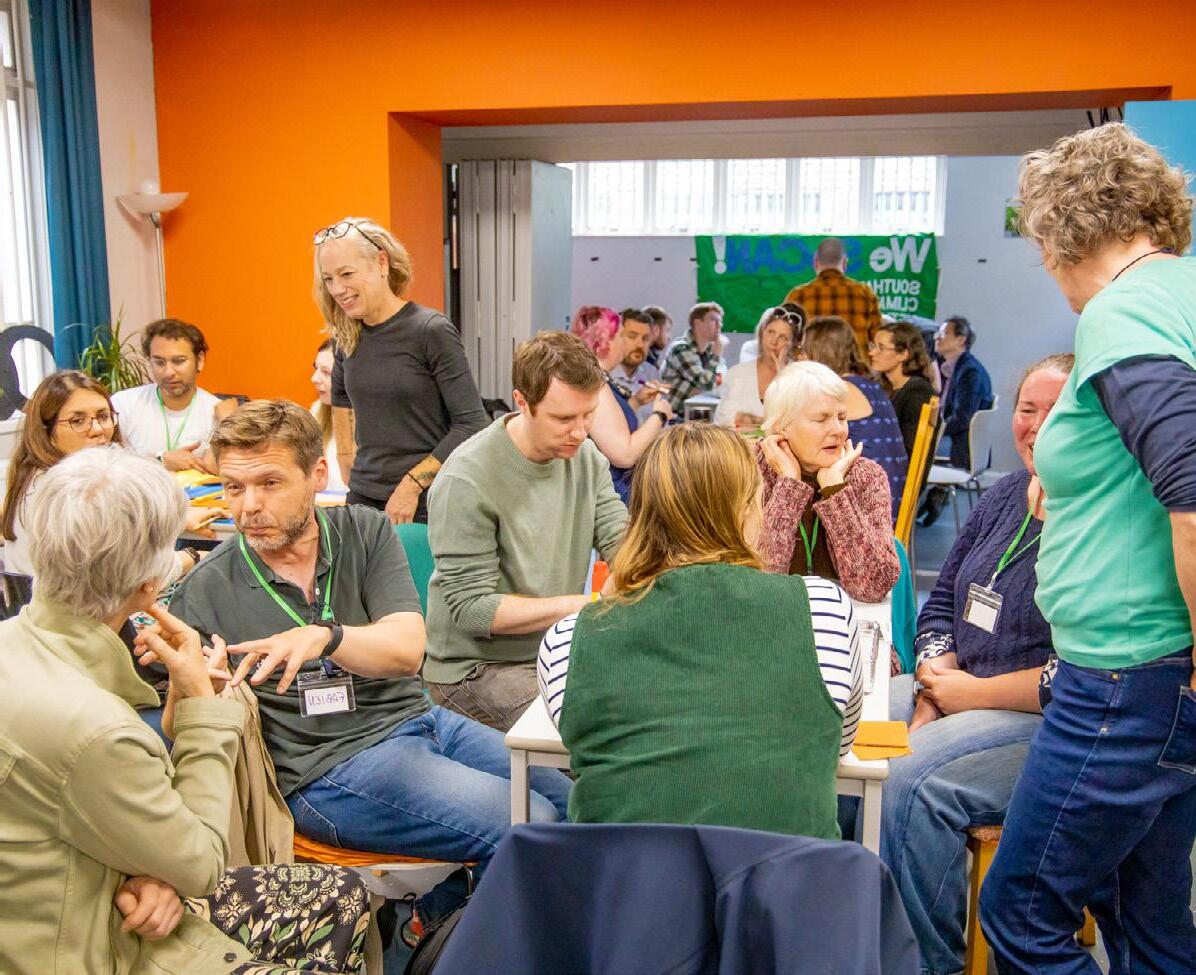
The University of Southampton has been rising in sustainability focused league tables, with rises in rank in the three key Sustainability League Tables UK institutions can be a part of: QS Sustainability (global), The Times Higher Education Impact Rankings (global) and People & Planet (UK only).
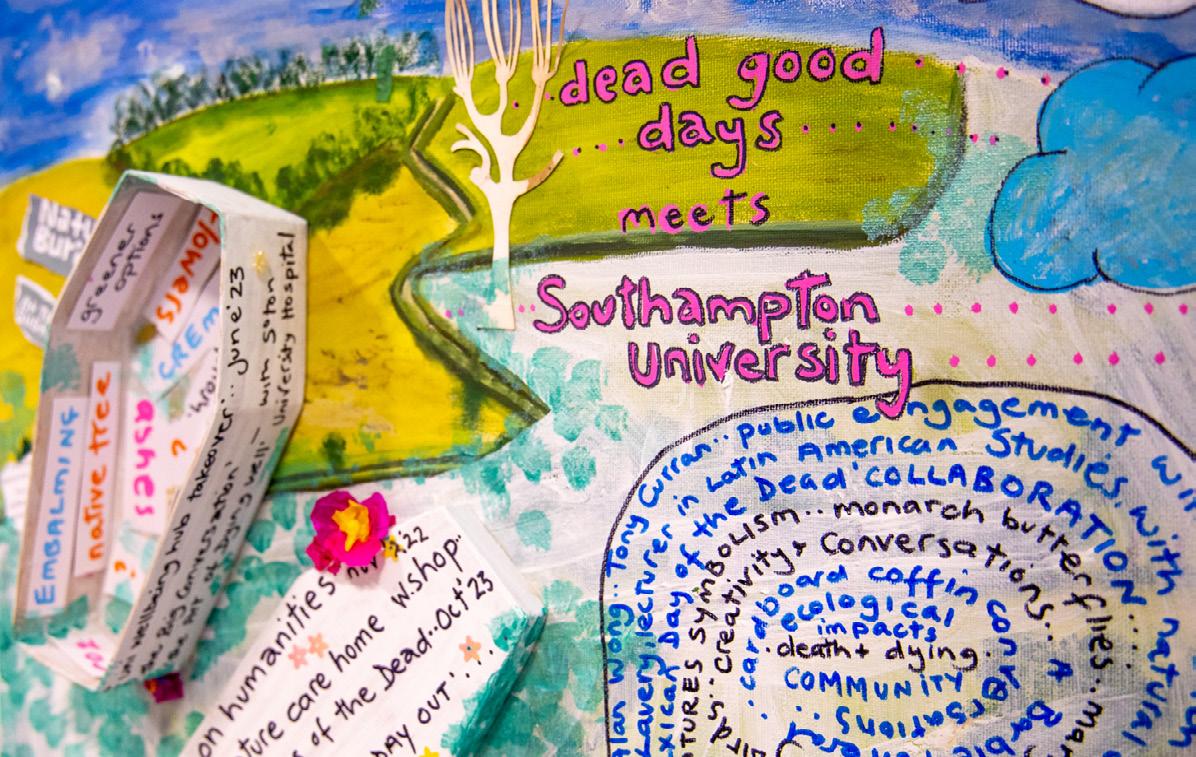
In 2023 the University of Southampton established the Sustainability and Resilience Institute (SRI), an interdisciplinary research institute tackling the most critical challenges facing society and our environment, through evidence-based solutions and collaborative work.
The SRI brings together all our inter and transdisciplinary work in sustainability across the university, giving students as well as staff opportunities to be involved in world-leading solutions led research, education, and enterprise.
Working in partnership with internal and external colleagues the Institute has a collective international reputation for addressing the most challenging elements of sustainability and resilience through interdisciplinary social, cultural, economic, political, and natural environment work.
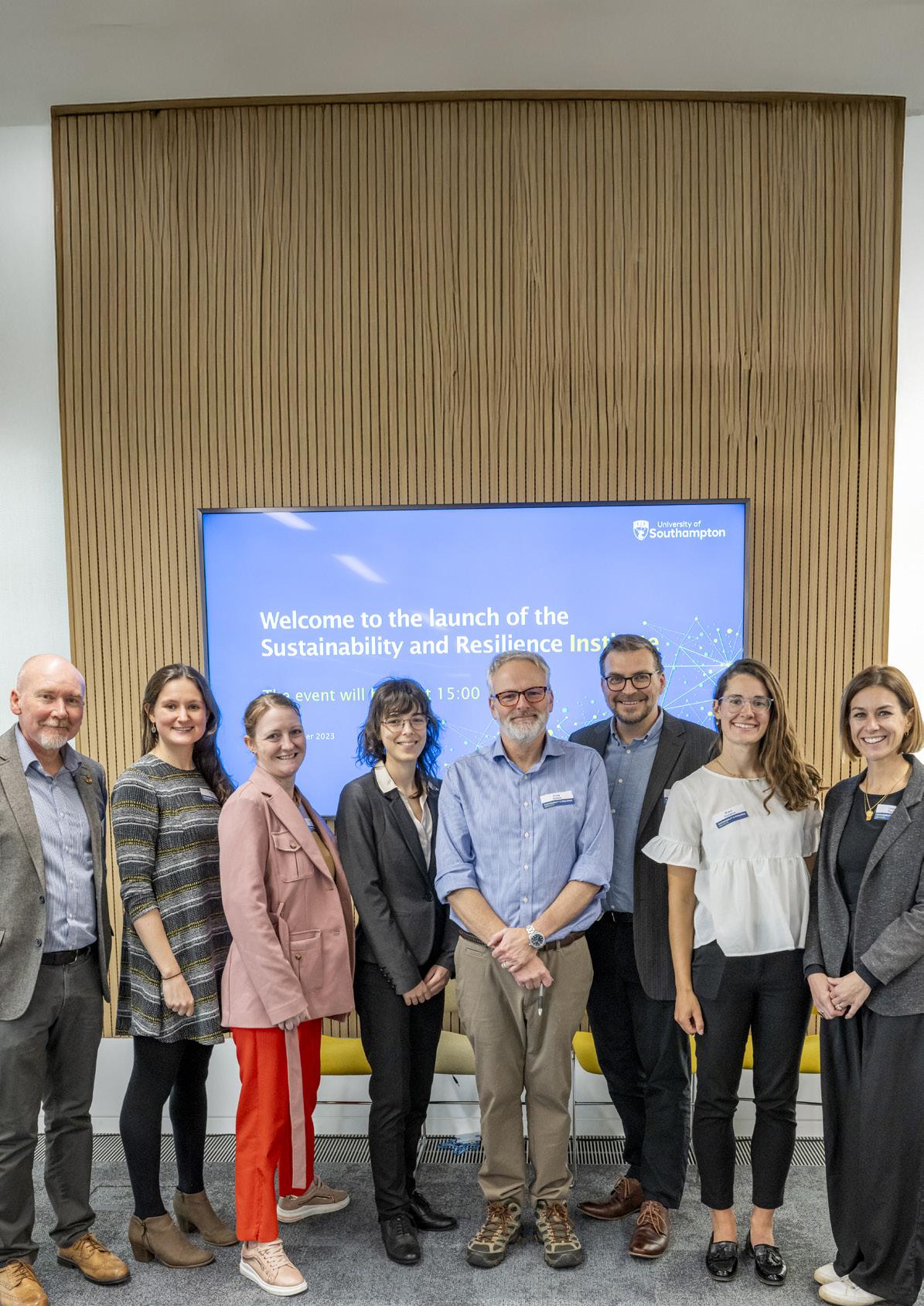
The work of the SRI is framed through the application of the University’s ‘triple helix strategy’ of intertwining our globally-recognised research, education and enterprise work with collaboration of people running through the centre of everything we do.
The SRI leads the reporting of the sustainability work of the University through the national and international Sustainability League Tables and the SDG Accord. The Institute has a designated Sustainable Development Goals Project Officer to support, monitor and report the University’s progress towards the UN Sustainable Development Goals.
With thanks to members of the Sustainability and Resilience Institute and the University of Southampton Community who contributed case studies to this report.
The Ignite Programme (Ignite Your Success) is the University of Southampton’s leading initiative for widening participation and advancing social mobility. Entirely funded by alumni and supporter donations, Ignite provides holistic support to students from backgrounds that are typically underrepresented in higher education, including those from low-income areas, care-experienced students, and recipients of free school meals
Since its launch in 2017, the programme has grown year-on-year thanks to the generous donations by the University’s alumni community, with over 160 current undergraduate students supported by Ignite Your Success in 2024-25 and even more to be supported from 2025-26 onwards. Those individuals on the programme benefit from a strong sense of community through social events and networking opportunities, whilst the programme also offers scholarships, bursaries and awards to help bridge the financial gap many students face. Additionally, a comprehensive package of support, including peer and alumni mentoring, skills-building workshops, one-on-one pastoral guidance, and guaranteed paid internships, is offered to students on Ignite Your Success.
The Sustainability and Resilience Institute this year hosted an Ignite Internship with first year student Elio Leka, the co-author of this report, Elio conducted a student perspective review of previous editions of the report, researched and reviewed case studies, drafted text for the report and worked closely with SRI's SDG Project Officer. Elio was critical to the success of the 2024 edition of this report and gained both research and independent working skills, whilst gaining a deeper understanding of the sustainability work done at the University of Southampton.
By addressing the financial and social challenges that many students face, Ignite empowers participants to succeed academically and personally. The programme plays a vital role in the University’s commitment to equity in education and makes a meaningful impact on student lives and futures.
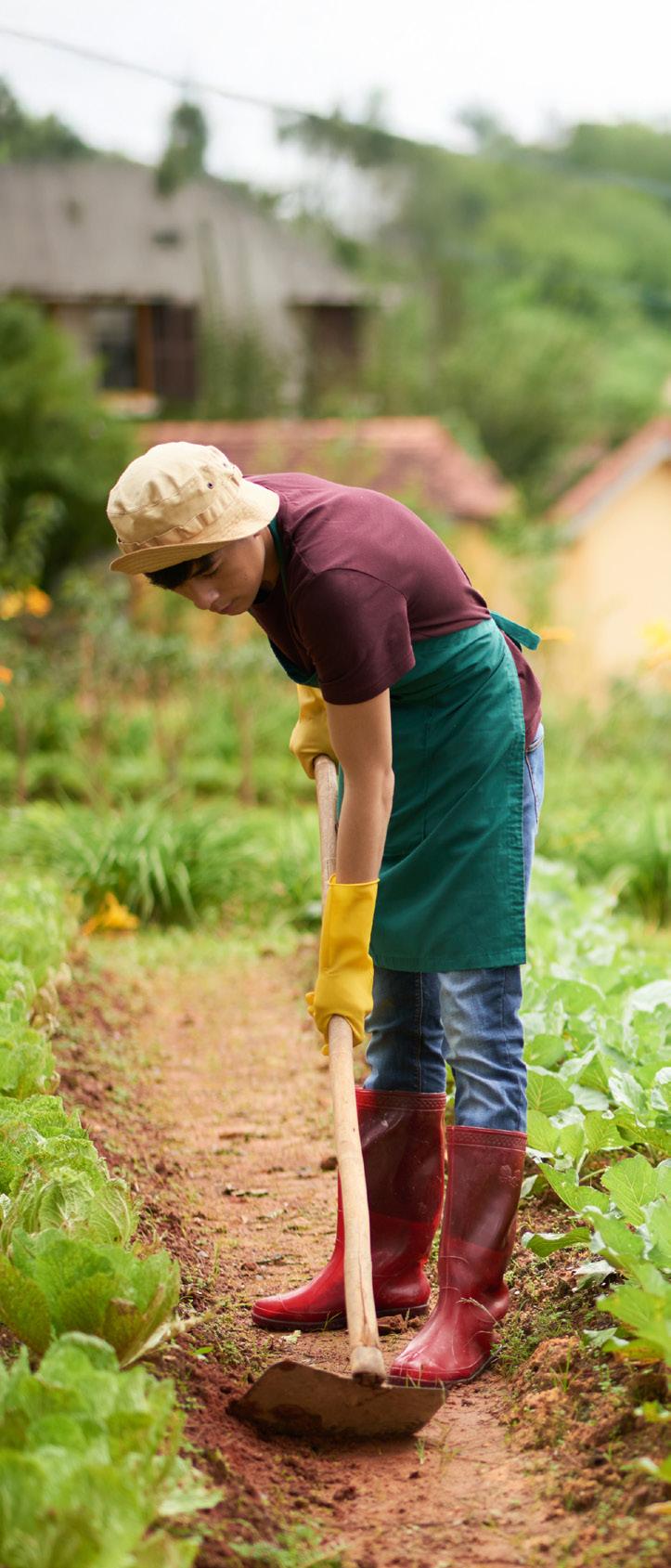
Whilst in this report we align projects with a singular SDG many of the case studies presented span multiple SDGs and are led by interdisciplinary teams often partnering with global academic, industrial and non-governmental partners and engaging with communities. We present these case studies through the lens of a single SDG to demonstrate the breadth of our SDG related work.
As a research-intensive institution the impact of our work matters, none more so than in the interdisciplinary field of sustainability. In the following SDG report we present our Field Weighted Citation Impact; this metric normalises citations of publications against publications of the same type in the same field to demonstrate performance against the average. This accounts for the fact that some topic areas may have less research papers published or the area may not be as cited as others.
A Field Weighted Citation Impact of 1 is the mean average for citations for that area of research globally. Therefore scores above 1 indicate an above average level of citation.
Our Field Weighted Citation Impacts for SDGs 1 to 16 can be viewed in Figure 1. This shows the total percentage of publications from 2021 to 2024 for SDGs 1 to 16.
The total percentage of citations from 2021 to 2024 for SDGs 1 to 16 can be viewed in Figure 2.
It is not possible to identify specific research aligned with SDG 17 (Partnerships for the Goals) so this is not included in Figure 1 or 2. On the report page for SDG 17 we show the total metrics for our SDG aligned research.
As can be seen in Figures 1 and 2 the University of Southampton has considerable output and impact in relation to Goal 3: Good Health and Wellbeing, Goal 2: Zero Hunger and Goal 5: Gender Equality with Field Weighted Citation Impacts over 150% higher than the global average showing the considerable research impact we have in these fields. These figures illustrate the scale of our activities and overall impact across all seventeen SDGs. all our Field Weighted Metrics for our research related to each SDG have been reported higher than 1.5, demonstrating all our research across the SDGs are cited 50% more than the average for that SDG.
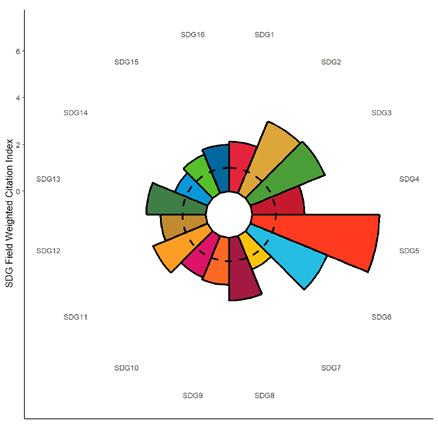
To develop this report, we conducted a review of research, education, engagement and operations for 2024 to present case studies of some of the Sustainable Development Goals work we conduct across the university.
The case studies in this report come from across all levels of our community to show the range and depth of work ongoing at the University of Southampton across research, public and policy engagement. We have included research from both world-renowned researchers in their field to early career researchers and postdoctoral researchers, representing the work of our students and staff to demonstrate the vital work all our University community do.
The report for each Goal is divided into four sections: Research, Education, Engagement and Operations. Members of the Sustainability and Resilience and wider University community have provided case studies that were placed in these categories. Please see the end of the report for our contributors.

RESEARCH: Any research activity undertaken by members of the University of Southampton, both staff and students.
EDUCATION: Including modules, field trips, opportunities provided to students in association
OPERATIONS: Any activities, internal policies, schemes or other activities related to how the University is run as an organisation.
We use research metrics to demonstrate how our research is being used and the impact it is having. This can be through metrics such as how many people have viewed or cited our research related to that SDG and how much research we have done aligned with that SDG. The
Research metrics were generated using the Elsevier 2024 SDG keyword queries on publications in the period 2021-2024 indexed in Scopus. Field Weighted Citation Index data was generated using SciVal. University datasets and publicly available HESA data has been synthesised to present further information on our operations and metrics.
Case studies are mapped to the targets of the Sustainable Development Goals with consideration of the Times Higher Impact Ranking methodology which translates the SDGs into a higher education context. Additionally, it is noted if the activity in the case study has a direct or indirect impact, i.e. if an activity is enabling progress on a target through education around it or providing a direct intervention. To see the targets, case studies are mapped to the

The University of Southampton is a consortium partner of the Data and Evidence to End Extreme Poverty (DEEP) consortium of universities in partnership with World Bank. The consortium seeks to build evidence, insights and solutions to end global poverty. The DEEP consortium aims to generate new global and national data that will be valuable to governments, citizens, researchers and governments in improving the lives of the world’s poorest people and eliminating extreme poverty.
Professor Helen Carr and colleagues from the University of Southampton interviewed more than 150 front-line staff from local authorities and other organisations working with rural homelessness, and more than forty people including service providers and those experiencing homelessness. The research revealed that a deep-rooted stigma and lack of focus on rural areas had hidden the issue from the public and policymakers, and without significant national policy changes, rural homelessness was likely to increase significantly in coming years.
Students on our Demography MSc learn firsthand about the issues and evidence surrounding poverty and population, and develop policy briefs on the topic as part of their assessment. This aids them in developing an understanding of these issues and how they impact different populations experience from poverty.
The Centre for Homelessness Research and Practice
Alongside developing vital research surrounding homelessness The Centre for Homelessness Research and Practice (CHRP) engages widely with external partners including Government representatives, local authorities and the NHS. For example, in the Moving Towards Independence project CHRP collaborated with Step by Step, a youth charity for young people experiencing hard times to develop guidance on young people moving from supported lodgings to independence.
We have a designated fund to support students who find themselves unexpectedly in financial hardship regardless of household income, course level or age.
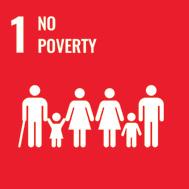
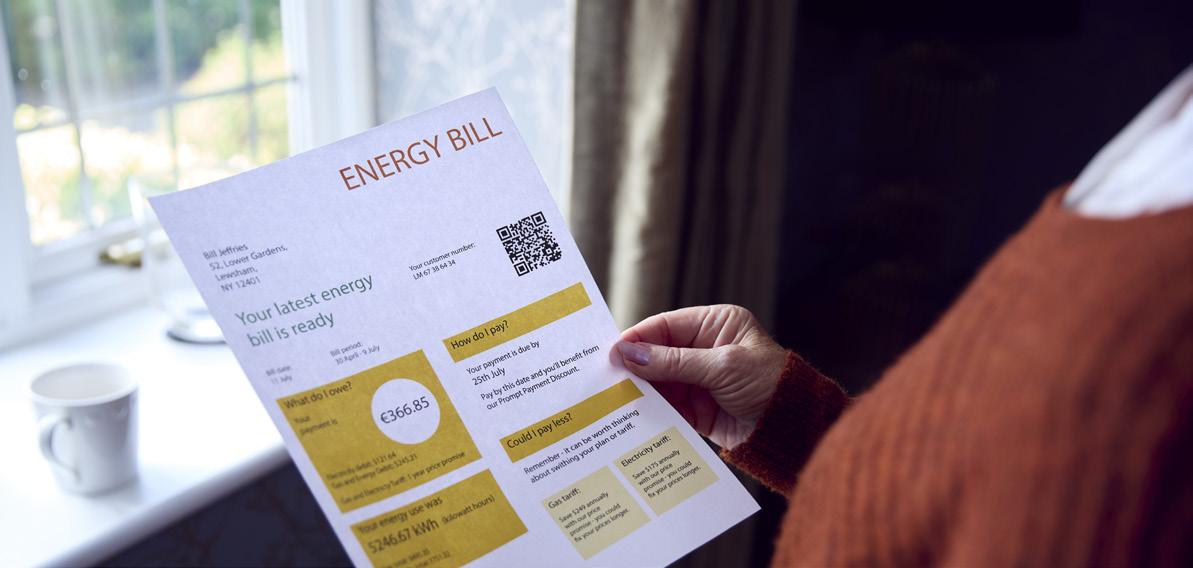

Data Analysis of the Impact of Climate Change on Food Security in Rural Ghana
Jessica Boxall and Michael Head investigated the effects of climate change on food security in rural Ghana using secondary data. This research sought to investigate the prevalence of household food security, and the perceptions of adults in Mion (Northern Ghana) of the impacts climate change had on health and food insecurity. This research found that moderate or severe food insecurity in these communities were higher than Ghana’s national average and global data. And over 99% of participants reported climate change negatively impacted their food security, and over 75% reported climate change as having made a difference to their health.
The University of Southampton’s School of Biological Sciences collaborated with Southampton City Council, with facilitation by Centre for the South, on a project mapping Southampton’s food systems This research found that children in Southampton are more likely than the average to be overweight or obese, rely on free school meals and suffer from dental decay. Additionally, this research explored access to adequate food stores with affordable healthy food and its relation to deprivation and diet. This work identified key recommended actions to improve Southampton’s food systems and generated a policy brief on this topic.
Our medical students are taught the importance of Food Systems in specialised modules, informing them on globalisation and public health nutrition, sustainable diets and the needs around national food security strategies.
The University of Southampton has a sustainable food policy that details our commitment to ensuring we source food provided on campus as sustainably as possible. Our on-site food outlets work to provide healthy and nutritious food options to students, staff and visitors at fair and reasonable prices.
Our Student’s Union have the SUSU Food For All programme, providing free tinned, dried and longlasting food to any student who needs it.
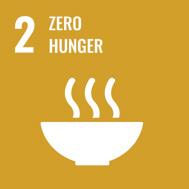
Number of Citations
Field-Weighted Citation Impact: 3.32

Find out more:
79.3% International Collaboration
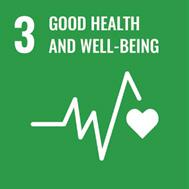
Research Outputs: 3973
97,133
Number of Citations
The Diabetes Together study – developing a couples-focused intervention to support selfmanagement of type 2 diabetes in South Africa. The study explored the feasibility of using places of worship in Cape Town as settings for recruiting couples to inform a planned evaluation trial of our Diabetes Together intervention. A results pamphlet for participants was produced, and the study has been published. This built on earlier phases (2019-2023): first, Individual interviews with couples living with Diabetes (CLWD). Findings were triangulated with literature to inform intervention development. Second, think-aloud interviews with CLWD to explore their experience of interacting with prototype intervention components; third, a pilot where couples received the intervention, and a process evaluation informed optimisation of the Diabetes Together intervention.
Toxic Legacies in the French Caribbean: Gendered Resistance, Activism, and Resilience
Doctorate in Clinical Psychology Sustainability Strategic Plan
In 2023, Dr Alison Bennetts developed a Sustainability Strategic Plan for the Doctorate in Clinical Psychology programme designed to embed the breadth of the SDGs across operational, educational, research, clinical, and leadership/ community engagement domains of the course. The plan is informed by the UoS strategic plan, professional and statutory regulatory body guidance, and uses the full breadth of the UNSDGs as a foundation. Each domain of the course has identified goals and key performance indicators to support monitoring of our progress. The strategic plan has been highlighted as an area of good practice in the School of Psychology Annual Report 23/24.
Engaging traditional health practitioners as key policy actors in South Africa
Traditional Health practitioners (THPs) are legally recognised through the South African Traditional Health Practitioners Act of 2007, and many

65% International Collaboration
The Health and Wellbeing PCE Hub, coordinated by the Public Engagement with Research Unit, was created in 2017 in direct response to a desire from local communities to engage in impactful health research. Of its 240 current friends/members, over 150 represent organisations in the city striving to ensure every resident has the highest possible standard of living. Through co-designed and co-delivered Effective Partnership Practice workshops, researchers and local charities met and devised the MOVE Communities forward project, which was funded by the Public Engagement Development Fund and is enabling local communities to access cutting edge mobility support technology – and the technology to have real-world impact. The Hub also supported the development of the Southampton Food Partnership project and Harmonies of Home projects which are supporting food security, and cultural wellbeing across the city.
The university provides 24/7 support in halls of residence for students, and all students can access mental health support including self-help resources, counselling, mindfulness classes and drop-in sessions. We have specially designated rest and study rooms for students with disabilities and long-term health conditions to ensure these students can study and relax on campus in the ways appropriate to them. We provide specialist support for those students who identify as neurodivergent and those with specific learning differences. This support may be in the form of 1:1 study skills support or specialist study skills sessions.
We have on campus health services that provide reproductive health care services.

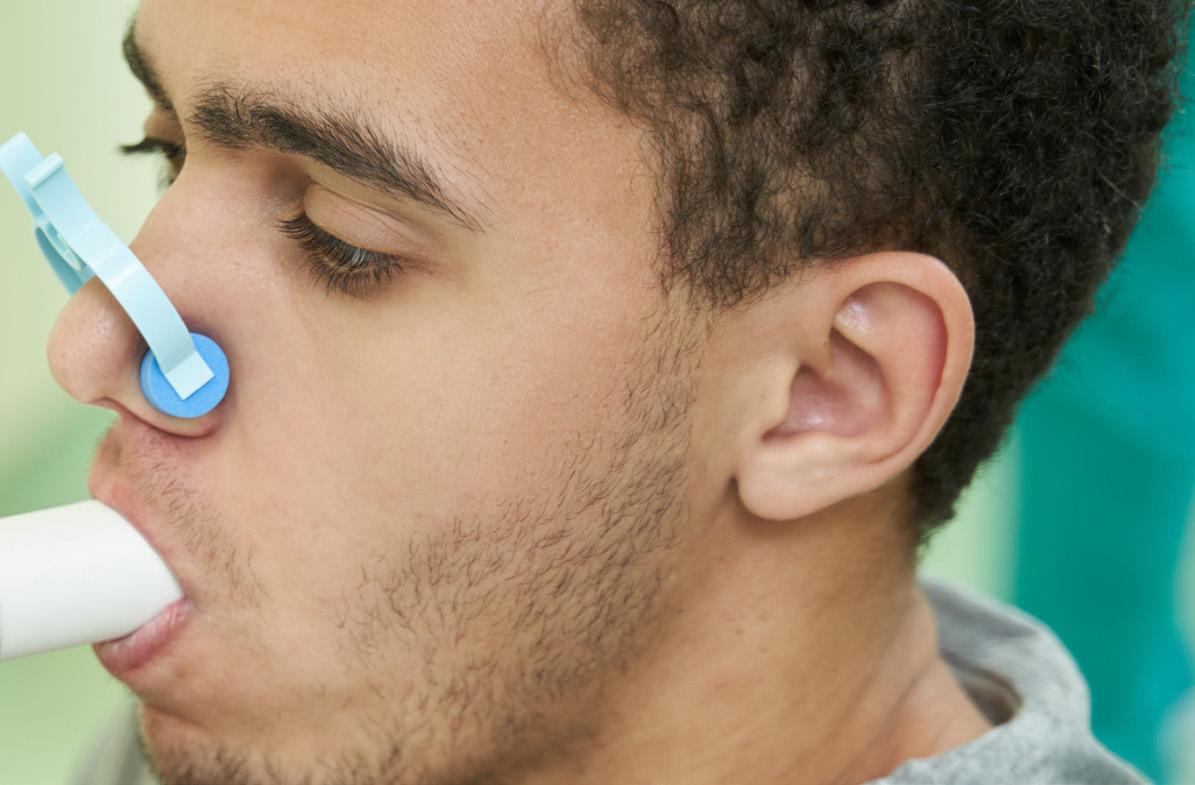

Despite significant progress since the adoption of the 2030 Agenda for Sustainable Development—including expanded access to essential services, reduced child mortality, and increased electricity access—critical challenges remain. With only five years left to achieve the Sustainable Development Goals (SDGs), merely 35% of targets are on track, leaving 800 million people in extreme poverty (Sustainable Development Goals Report 2025).
The UN’s 2025 SDG report reveals persistent gaps in the data needed to identify challenges, formulate solutions, and monitor implementation. Data availability and timeliness issues affect all 17 SDGs (Campbell J, ‘We lack data for 68% of SDG indicators’) . Only one-third of datasets include age or sex disaggregation, while geographic disaggregation remains even more limited. This creates significant risks that marginalised and vulnerable communities will be left behind.
National statistical systems face mounting pressures that threaten their ability to provide robust data foundations for SDG analysis. Rising conflict frequency across multiple regions, ongoing COVID-19 impacts on data collection, declining survey response rates, and reduced funding for statistical systems create a “perfect storm” of constraints, alongside an already infrequent decennial census cycle.
As countries approach both the end of the 2030 Agenda and the 2030 census round, innovative methods are needed to address these data gaps. Gridded population data offer a consistent and reliable data source that can serve as a denominator for measuring progress and identifying policy gaps.
WorldPop, an applied research group within the School of Geography and Environmental Science, specialises in integrating statistical and geospatial data to construct high-resolution, gridded population estimates. WorldPop has produced over 45,000 datasets at global and national levels, addressing various sustainable development challenges. These modelled datasets help countries fill critical gaps in their data infrastructure. Diverse nations including Afghanistan, Burkina Faso, Cameroon, Colombia, Papua New Guinea, and Thailand have all applied WorldPop methodologies to enhance their census and survey data.
Gridded population data provide multiple advantages beyond supporting national governments. They facilitate cross-border analysis, which is crucial since major challenges like pandemics, conflicts, and natural disasters rarely respect administrative boundaries. Regional analysis using consistent, reliable gridded data enables more effective responses that save lives and livelihoods.
At the global scale, the organisation integrates publicly available census data with geospatial datasets to produce 100m/1km gridded population estimates for the entire globe. Open access to these global data enables development and humanitarian agencies to integrate population estimates seamlessly into their analysis, producing consistent and comparable insights that drive more informed decision-making. Our data is featured on the Humanitarian Data Exchange Hub, for example, which recorded over 44,000 downloads in the second quarter of 2025 by the humanitarian community.
During 2025, these global data were updated to incorporate the 2020 census round and latest geospatial datasets for more accurate and timely global estimates. This data was formally launched in September 2025.
WorldPop has co-developed bespoke national and subnational population estimates with over 40 countries. This collaborative approach utilises microdata directly from National Statistical Offices (NSOs) and ministries of health to produce estimates with greater certainty, while building ownership and usage by working with governments to define requirements and use cases.
While WorldPop data has not yet been integrated into all SDG targets and indicators, the openness of global data and engagement with NSOs has enabled gridded population estimates to support numerous activities related to the 2030 Sustainable Development Agenda.
A significant proportion of WorldPop activity has been done in support of health-related activities. Health focused donors such as the Gates Foundation, the World Health Organisation and the Clinton Health Access Initiative (CHAI) have funded WorldPop to integrate high-resolution gridded estimates into health initiatives that support improved site optimisation for equitable distribution of health services, improved effectiveness and efficiency of microplanning activities and improved effectiveness and efficiency of health program strategy and plans. Examples of the impact that WorldPop have had related to good health and well-being includes:
→ WorldPop’s Ghana 1km live birth estimates informed CHAI’s mapping of newborns within sickle cell screening site service areas in Ghana. The analysis from this work improved the optimisation of new screening sites, which was done in collaboration with the Ministry of Health, Family Health Division of Ghana Health Service, and Noguchi Memorial Institute of Medical Research. Adding seven sites from this analysis could result in screening 10,211 more infants, representing a 42% increase in screened newborns.
→ In Kenya, the WHO, and CHAI collaborated with government agencies to leverage WorldPop’s population estimates to plan, distribute, and monitor vaccines, specifically for the polio campaign.
→ CHAI uses WorldPop’s population estimates from the Georeferenced Infrastructure and Demographic Data for Development (GRID3)
programme to quantify target populations and identify optimal locations for community care sites in the Democratic Republic of Congo (DRC). In Ethiopia, CHAI utilised WorldPop’s population estimates to make decisions on locations of oxygen plant sites that could benefit more than 7 million people.
→ WorldPop enabled CHAI to increase malaria testing by 18% in Banga Lubaka, DRC. CHAI works with national governments and the private sector to strengthen and sustain health systems by providing strategic and technical support to increase access to healthcare and healthcare products.
→ WorldPop worked with Nigeria’s National Primary Health Care Development Agency and Gavi (the Vaccine Alliance), to utilise gridded population data and estimates of DTP1-3 and measles vaccination coverage to produce estimates of numbers of zero-dose and under-immunized children that were used to prioritise 100 local government areas for targeted routine immunisation interventions and increased access 67 LGAs.
→ WorldPop researchers worked closely with the Afghan national statistical offices, UNFPA and Flowminder to produce population estimates at national, provincial, district, enumeration area and 100m grid cells for Afghanistan. The results of the population estimation were presented to President Ghani, the government and a range of international agencies in Kabul, and the estimates have been adopted by all UN agencies and many others working in Afghanistan. The new data showed that there were more than a million additional children under the age of five years old in Afghanistan compared to the official projections. This evidence was used to obtain additional funding to purchase sufficient childhood vaccines, and the high-resolution population estimates were used to design and implement vaccine delivery.
→ Namibia’s Ministry of Health, supported by the Global Fund and CHAI, used mobility and malaria risk maps produced by WorldPop to target bed net distribution and indoor insecticide spraying to key areas. Instead of the daunting challenge of immediately covering 1.2 million people – the previous estimate of the population at highest risk of malaria – the National Vector Borne Disease Control Program used its limited resources to first reach the 80,000 people most important to the malaria transmission cycle.
→ UNESCO developed a simulation model that helps Ministries of Education anticipate the next few back-to-school periods to allocate teaching staff or send textbooks based on the number of expected students in different schools and classrooms.
→ Data Science Nigeria leveraged WorldPop’s granular 1km by 1km administrative level population estimates to identify low-income students for their “Learn at Home” initiative. This project provided at-home educational materials to children who faced significant barriers to learning due to the COVID-19 lockdown and subsequent school closures. As a result, the Learn at Home initiative reached nearly 8 million learners in Nigeria and globally.
→ UNESCO combined WorldPop’s population estimates with the 2020 Togolese census data to estimate the presence of school-age children and adolescents in planning for education interventions.
→ In Nigeria, the National Bureau of Statistics uses WorldPop’s population estimates to conduct Multi-Indicator Cluster Surveys and generate reports on indicators for women and children, such as the rate of stunting and breastfeeding mothers
→ In DRC, the National Agency for Digital Health (ANICNS) mentioned that the government, using WorldPop data, was better informed about the distribution of pregnant women living within more than a 5km radius of an existing health facility.
→ WorldPop’s population estimates enabled Facebook/Meta’s Data for Good
programme to provide access to shelter and clean water to 70,000 people in Nairobi and 800,000 people in Northern Ghana. WorldPop’s data served as the foundation for population density mapping across 70 low- and middleincome countries, with population density data accounting for 90% of Data for Good’s recorded impact over six years.
→ Currently, the National Administrative Department of Statistics (DANE) in Colombia used WorldPop’s PreEA tool to automate the delineation of economic units and the allocation of operational teams to each unit in preparation for the country’s economic census in August 2024. Before using the PreEA tool, DANE manually assigned 12,000 census officers to survey areas. WorldPop’s PreEA tool has enabled a more equitable distribution of workloads to census officers across 2000 economic units. This has significantly reduced the time required to delineate a city’s economic unit from 2-3 days to five minutes. Therefore, the PreEA tool has helped DANE save time and optimise costs for delineating survey areas by requiring fewer human resources to complete this task
→ The Food and Agriculture Organisation (FAO) uses WorldPop’s population density data to improve the Biodiversity Integrated Assessment and Computation Tool (B-INTACT) methodology. The tool assesses the impact on biodiversity of various investments at project, programme, and policy levels. FAO uses WorldPop’s population density data as one of the covariates for metaanalysis to produce more granular and fine-tuned monetary estimates in more countries.
Written by Ian Coady and
WorldPop
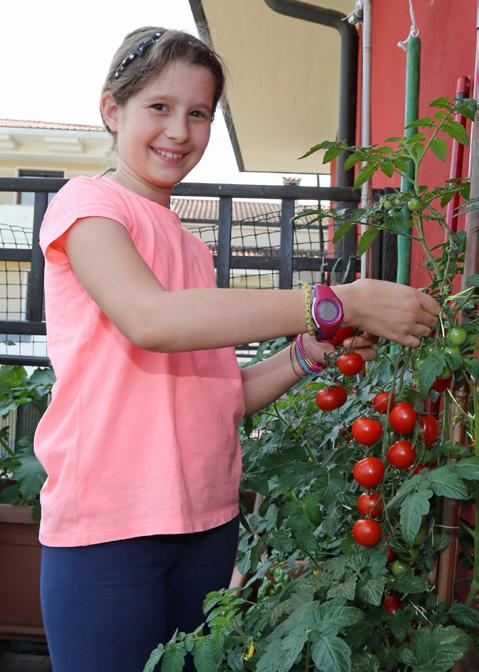

Readdressing Social Injustices and Risk Reduction in the Aftermath of Disaster Through Education
Research led by Dr Wonyong Park from the Southampton Education School considers how disaster justice education could be integrated with community-engaged participatory research to foster collaborative learning and identify education priorities within the Grenfell Tower fire community in London. The project findings highlight the critical importance of education in shaping the national memory of disasters and addressing injustices in British society. It also shows that participatory research with disasteraffected communities can produce relevant and culturally sensitive research that identifies local needs and priorities.
We deliver an education programme in primary schools teaching children about concepts around sustainable farming and healthy eating, run by our Enactus students. We specifically target primary schools in disadvantaged areas, as it is here that healthier food tends to be less accessible, due to elevated prices. Alongside this we also set up hydroponics systems in the schools and teach children how to use them, providing them with an accessible means of growing fresh, healthy food. This is fully funded by the Seesd for Thought Enactus team selling hydroponics kits to the public, both in person and through online sales.

SOTSEF
The Southampton Science and Engineering Festival (SOTSEF) is our annual and awardwinning public science festival. The festival runs over a period of ten days and visitors can experience a wide range of innovative and fascinating interdisciplinary events, from live performances to interactive activities to tours of our would class laboratories and facilities. Visitors of all ages and backgrounds can engage with university staff, students and researchers.
The University provides free online learning through platforms such as FutureLearn where the public can learn about a wide range of topics, from addressing global challenges to the uses of insulin.
ePrints Soton provides students and staff access to research from across the institution, giving students access to our world class research to further their studies and knowledge. Our library services provide support to students with subject guides, one on one support, study skills support and Special Collections with around 7 million manuscript items and 50,000 printed books.
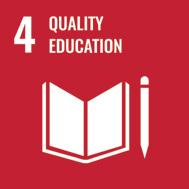

Child marriage remains present in India, a deeply rooted tradition perpetuated across generations. However, the country’s transition into a modern era marked by economic growth and development has not been sufficient to eliminate this custom. Child marriage continues to infringe upon fundamental rights—most notably, the right to education—along with other essential aspects of childhood that must be protected. In this context, Amruta Sadashiv Bagwe’s doctoral thesis examines how underage girls remain vulnerable to child marriage despite the tightening of legal frameworks, primarily because entrenched social norms continue to outweigh the deterrent effect of legal sanctions.
The Stefan Cross Centre for Women, Equality and Law was established due to a generous donation from Southampton Law School alumnus Mr Stefan Cross KC. The Centre researches the structural, societal, legal and regulatory issues around gender discrimination using a multidisciplinary perspective.
The University in partnership with the British Council offer five fully funded scholarships for female students from several South Asian Countries to address the imbalance of women represented in STEM subjects. The scholarship is for eligible postgraduate study and covers all costs.
The Athena Swan Committee, in collaboration with the UK Women in Economics Network organised an event featuring distinguished speakers including Dr Sandra Batten (Bank of England), Alia Qamar (PwC), and Professor Jo Swaffield (University of Southampton). The speakers shared their insights on their professional journeys and spoke about access into careers in the public sector, private sector, and academia. The aim was to empower female students in economics by showcasing the diverse range of career opportunities in the field.
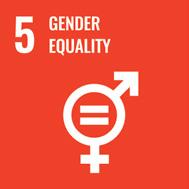
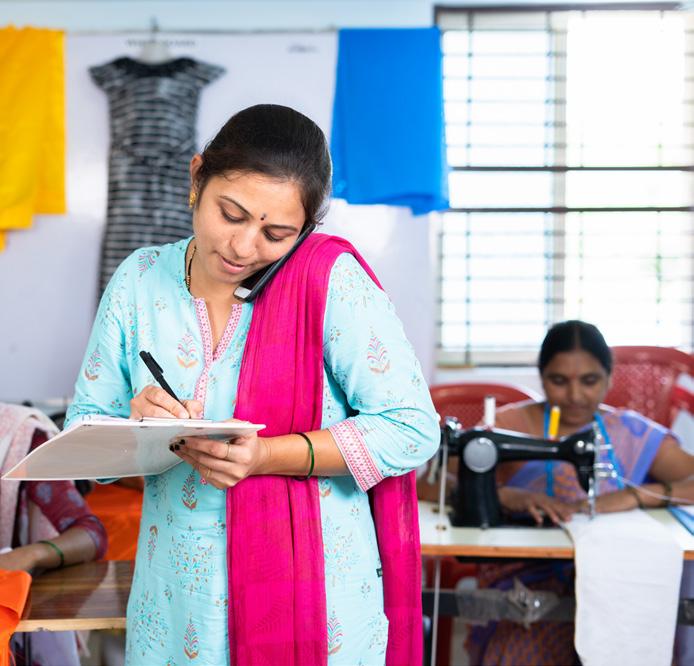
The University of Southampton is a founding signatory of the Athena Swan gender equality charter and holds an institutional Silver award. As a signatory, we recognise the specific challenges that affect men and women in academic careers, which leads to fewer women at senior levels of higher education. We are committed to addressing these issues, to maximise the potential of all our people.
An Athena Swan Silver award recognises a significant record of activity and achievement by the institution in promoting gender equality and in addressing challenges across different disciplines. The University has numerous departmental awards held by faculties and schools. Find out more: Scan the QR Code to listen

Macroinvertebrates as Biomonitoring Indicators
Environmental Science Undergraduate student
Ella Hyde’s dissertation “An Investigation into Macroinvertebrates as Biomonitoring Indicators
Along a Rural-Urban-Rural Gradient in Norfolk: Implications for Aquatic Ecosystem Health” investigated how urbanisation affects aquatic ecosystem health in Norfolk’s chalk rivers using macroinvertebrates as bioindicators. Six sites along a rural-urban-rural gradient on the Rivers Wensum and Yare were sampled, primarily using coir mat samplers. Significant declines in sensitive macroinvertebrate communities were observed in urban and downstream areas. Community structure was assessed through family richness, abundance, ASPT, EPT, and Shannon-Wiener diversity. Specifically, dissolved oxygen, flow, depth, and width showed significant relationships with ASPT. Results highlight the need for enhanced mitigation measures in urban locations, but also in downstream locations where urbanisation impacts are compounded by other land use influence.
Phosphorus in Chalk Streams
University of Southampton researchers are working in partnership with the Environment Agency, Hampshire and Isle of Wight Wildlife Trust, the Test and Itchen Association alongside other partners to determine the key processes that contribute to phosphorus entering chalk streams. Phosphorus can cause deterioration of chalk streams and understanding the processes contributing to increased phosphorus in chalk streams in aid in managing risk and recommending methods of evaluation and management of phosphorus in chalk streams.
We provide a focused Water Pollution module, this provides students with a comprehensive
understanding of the fundamentals of the issues currently surrounding water pollution, and the science behind the consequences of different types of water pollutants and their sources and modes of transport into our waterways and marine environments. This module leads to many students conducting high-quality sustainability research as demonstrated by the Macroinvertebrates as Biomonitoring Indicators research addressed above.
Future Towns Innovation Hub, the University of Southampton Civic Office and the Sustainability and Resilience Institute co-hosts the Clean Water South Network.
Clean Water South hosted a workshop entitled, “Clean Water South: Improving water quality of our rivers for people and nature”. The aim of this workshop was to bring together a range of stakeholders to share information and develop collaborations to solve the challenge of improving water quality of our local rivers and improve the quality of life for people in the city and surrounding areas by driving cultural change that enhances human wellbeing and environmental sustainability. We showcased current research including novel water quality monitoring approaches using sensors, data analysis using Artificial Intelligence (AI) and the Internet of Things (IoT), and systems modelling that accommodates social, economic and environmental pillars of sustainability.
Free drinking water is provided across our campuses with water fountains widely available for students to fill their reusable cups and bottles. We measure and monitor our water usage across campus to work towards reducing our overall consumption.

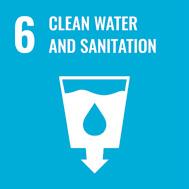
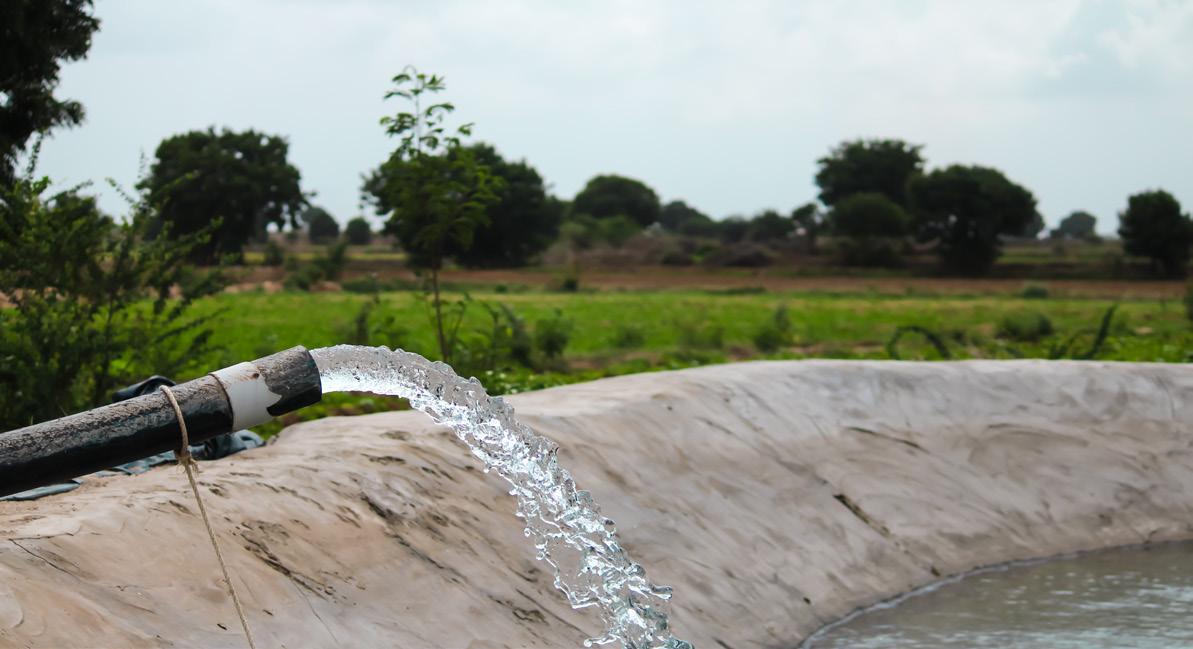

Within the University of Southampton, energy research and development is conducted within the Energy & Climate Change Division encompassing the Sustainable Energy Research Group, established and led by Professor AbuBakr Bahaj since 1990 and the Coastal and Climate Research Group. The division undertakes a huge range of critical energy research including, but not limited to research related to; renewable energy, energy efficiency, energy development and capacity building.
The Energy for Development Network (e4D) is a long running programme aiming to initiate studies in electricity access for low-income and hard to access areas in Sub-Saharan Africa, aiming to bring together research and implementation of rural electrification projects. The projects under E4D include mini grids in Kenya and Uganda, solar home systems and capacity building.
We offer a Mechanical Engineering/ Sustainable Energy Systems Master of Engineering course. Students undertaking this course will develop core and advanced skills in affordable and clean energy, with focuses on fuel cells, photovoltaics, biomass systems, tidal energy and wind turbines. This course is accredited by the Institution of Mechanical Engineers, the Engineering Council and the European Accreditation of Engineering Programmes.
The University of Southampton is a partner pledge for The Green City Charter for the City of Southampton, which commits to using energy generated from renewable sources and net zero by 2030.
The University of Southampton is on a 100% renewable energy tariff and all energy paid for by the university is generated by renewable sources, such as solar and wind.

Find

Dr Joe Atkinson, Lecturer in Employment law, is undertaking research examining how we can regulate new workplace technologies to ensure a decent future of work. This includes the law relating to platform work in the gig economy, and the regulation of workplace surveillance and algorithmic management systems. In addition to his academic work, Joe has published reports on these issues with leading think tanks.
Recognising the growing opportunities within sustainably focused jobs, colleagues from the Central Careers service, CEPAR (USBS) team, local professionals and Oxford Brookes University guest (Dr Karen Cripps), collaborated to provide Green Careers workshops. These included tips, advice and independent development activities, aimed at encouraging students to think carefully about which role; with which employer; and which professional identity they aspire to; using how to work sustainability as the leading selection criterion. Students continue to use this advice to carefully select opportunities and to make responsible changes in their working lives, within placements, internships and graduate roles.
We offer careers support for our alumni, giving them life-long access to our in-depth career resources and access to our careers fairs and workshops. Alumni can engage with our UoS Career Hub to further their employment.
The University of Southampton recognises the right of our employees to union membership and provides Union information to employees and potential employees. Find out more:

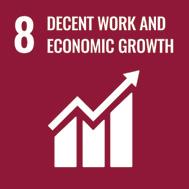

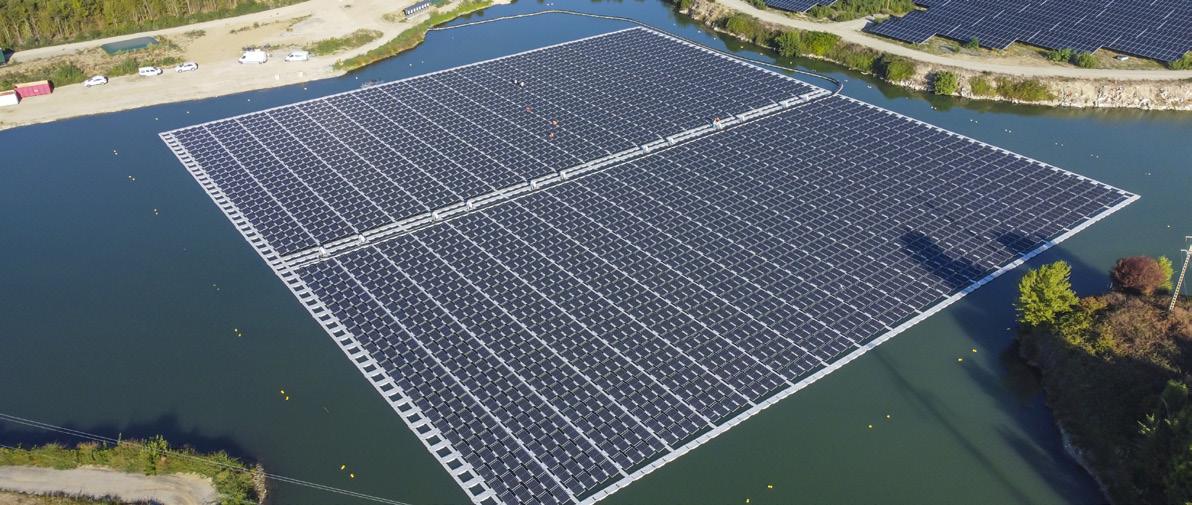
The University of Southampton was awarded UK Research and Innovation funding to lead a new Artificial Intelligence Centre for Doctoral Training in AI for Sustainability (SustAI). PhD researchers enrolled in the centre will research a broad range of vital topic areas concerning the potential for AI to be applied to sustainability challenges.
Our Civil Engineering students can undertake the Liveable Cities module, gaining insight and context for the complexities of shaping cities into places that meet people’s needs across work and life.
Following from this module students complete a City Infrastructure Design Project, developing a project that works towards a particular issue or impact. Projects integrate concepts of sustainability project management and structural design, with students developing the project from concept to deployment plan.
Student Innovation Projects provide students with the opportunity to gain work experience working with students from other disciplines on a real-life business issue. The student group will be paired with a non-profit group or business to solve problems and gain valuable skills.
Our Foundership scheme gives students the opportunity to develop their own business ideas with £3000 funding, expert support and skill development over the 12-week scheme.
The University of Southampton is part of the SETsquared partnership between six top research universities in the UK. SETsquared is a business incubator that provides acclaimed programmes to develop innovative ideas into successful businesses. Since its launch in 2002 SETsquared has supported over 5000 entrepreneurs in raising investments of over £3.9 billion.


Future Towns Innovation Hub situated in the University of Southampton Science Park provides a collaborative industry-academic Centre of Excellence that amalgamates expertise, skills, and knowledge with cutting-edge research laboratories, conveniently accessible to local businesses and enterprises, to promote innovation.
The AI & Society PCE Hub, was launched in October 2024 at Network Eagle Lab in Southampton City Centre and is coordinated by the Public Engagement with Research Unit. This hub aims to avoid the adoption and development of new tools and technologies exacerbating existing inequalities and bringing to the fore existing systemic prejudices. With AI, we believe we have a chance to change that - to slow this down, or even avoid it completely - and maybe even use AI to reduce inequities in society rather than increase them.
Over 70 people took part in facilitated discussions on AI in relation to other topic areas ad activities hosted by experts from across the city. Over 160 new connections were made at the event and AI & Society PCE Hub now has over 140 friends/ members who regularly engage with newsletters and events, including doubling the number of expected participants in the AI Otherwise workshops. Working together across such projects gives us the best chance of using AI as a tool to create a more equitable society in which everyone can thrive.
Find out more: Scan the QR Code to listen to a podcast episode related to this SDG!
Research Outputs: 802
17,587
64.8%
The University of Southampton’s FutureWorlds is a start-up accelerator that supports students and staff in becoming founders of their own start up businesses with innovative ideas and support from successful mentors. Startups supported by FutureWorlds have found success globally and cover a broad range of innovative concepts, from AI to biotech.

Research led by Dr Dalia Tsimpida has uncovered significant inequalities in hearing loss prevalence among adults of similar age, showing that socioeconomic position and geographic location play a key role in hearing health outcomes. These findings challenge the reliance on demographic estimates over robust epidemiological data in shaping hearing health policy. This work has already informed national recommendations and has the potential to reduce global health inequalities and improve hearing health and quality of life for millions of people worldwide.
The University is part of The NIHR Challenge: Maternity Disparities consortium, a national consortium of universities and partner organisations. Southampton leads collaboration of research developing a maternity journey for women and their partners, from preconception through post-delivery. Integrating preconception and interconception health into public health strategies on nutrition, obesity, smoking, and alcohol use, and addressing broader determinants of healthcare access, such as poverty and racism aiming to create a more equitable care system that addresses the needs of all women ensuring healthier outcomes for future generations.
Across our degree programmes we run numerous modules examining inequality, its causes and impacts. Our Wellbeing, Inequality & Place module examines the unequal distribution of health

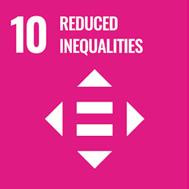
outcomes across space and examining contemporary issues such as environmental racism, the refugee crisis and food poverty. We also provide the module Inequalities in Everyday Worlds which considers the experiences and meanings of inequality.
Our Public and Community Engagement Hubs coordinated by the Public Engagement with Research Unit (PERu) have worked closely with Board in the City CIC on social impact and recording social impact. Board in the City CIC not only have immense social impact in reducing inequalities but are experts in recording it. Through joint events, exhibits and other activities the partnership has developed. We Make Southampton Community Media worked in partnership with UoS staff to produce short films both promoting the aims of the Future Cities PCE Hub, and aligning. We have also benefitted from their expertise when planning the Public Community Engagement Hubs’ refreshed programme of activity, run joint events, and showcased each other’s work.
The University of Southampton has a dedicated Equality, Diversity and Inclusion Strategic Plan ensuring everyone feels welcome, included and supported for who they are and equality, diversity and inclusion are embedded in our University Strategy
We are an accredited Disability Confident Leader, we ask all applicants in their submission if they wish to be considered under the Guaranteed Interview scheme. Voluntarily opting into this scheme means we offer any applicant with a disability an interview if they meet the minimum requirements of the role.
The University of Southampton joined Advance HE’s Race Equality Charter and received the REC Bronze award. The University adopted the Race Equality self-assessment framework as a rigorous and transparent means of understanding and progressing race equality across the institution, and as part of this process a Race Equality Action Plan has been developed.
The Southampton Institute for Arts and Humanities (SIAH) places culture at the heart of world-changing research. The institute works across a broad range of subjects, collaborates broadly and promotes the vital insights of the arts and humanities fields. The institute uses creative methods to engage with communities and supports local, national and international projects.
We have been working with the local authorities to help analyse air quality measurements from sensor networks in the region and understand how air pollution impacts the health of our communities. The results highlight how air quality effects urban and rural regions alike and that a coordinated effort is required to reduce background pollution concentration levels in the region.
The Winchester School of Art is part of the University of Southampton and is one of the leading art and design institutions in the UK. Providing education across the arts, the school provides valuable education and training related to our cultural needs and understanding how design affects our sense of community and space.
The most recent Southampton City Council Housing Survey (2008) found that 38% of privately owned and rented homes in the city did not meet the Decent Homes Standard. Unsafe housing conditions negatively impact health and educational outcomes for many households including students, and particularly for families with young children. Professor Helen Carr and Dr Mark Jordan, co-directors of the People, Property, and Community research centre are working with the Council to strengthen its housing enforcement against errant landlords, gather timely data on housing conditions and support tenants asserting their housing rights to safe housing conditions.
During 2024, the Creating collective visions of a sustainable future through visual storytelling project
was awarded Public Engagement Development Funding by the Public Engagement with Research unit (PERu) Following a series of research workshops using innovative storytelling techniques and live drawing to bring together oil and gas industry employees and climate activists to co-create climate solutions. This project shares workshop learnings and methodologies with educators, researchers, and community members to enable the development of connections across the university and community, beyond the boundaries of disciplines and social groups, to overcome differences in opinions and collectively envisage paths towards a sustainable future.
The Future Cities PCE Hub, coordinated by the Public Engagement with Research Unit, brings together over 100 individuals and organisations continuing to make Southampton a vibrant, peopleoriented city that promotes healthy, sustainable living. It champions citizen-led city-design and empowering residents to create the city they want to live in. Events in 2024 included a Film Night as part of the Southampton Arts & Humanities Festival – three local short films were showcased with introductions from the makers (We Make Southampton, Southampton National Park City, HIWWT) followed by discussions and networking attended by over 50 people - and Games Nights at Board in the City with the other PCE Hubs at which games created by PCE Hubs friends/members were available to play alongside specially curated games Board in the City’s extensive collection, encouraging friendly & open discussions about what matters to people about their city.
On Highfield Campus we have the University of Southampton’s music venue Turner Sims, this venue brings the joy of music into our student and local community with performances from students, emerging artists and musicians of high renown. Turner Sims provides School Concerts and is part of the Southampton Cultural Education Partnership.


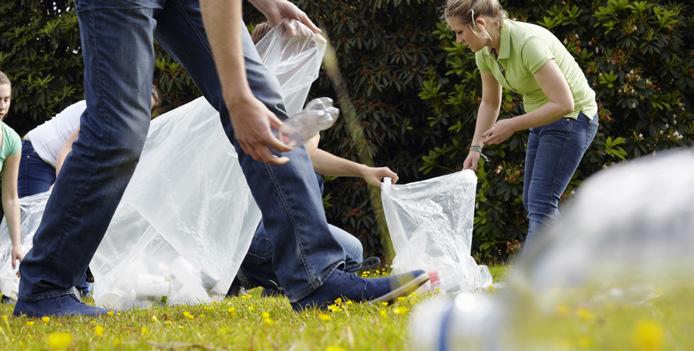

The Civic University Agreement is now in its third year and is generating new research with the University and its civic partners; the five local authorities where the University has a footprint. Our approach to our Civic University offer is we seek to help transform lives and livelihoods across the Hampshire and the Solent region by harnessing our powers of research, knowledge and innovation to address regional challenges and opportunities. The research it has enabled contributes to the Sustainable Development Goals the University is working to achieve.
For example, as part of the Clean Air Network, we are contributing to SDG 3 – good health and well being. This year we facilitated the publication of a new report by the network, highlighting the particular problem of emissions across the region. We also engaged the visitor economy to bring together businesses and transport providers in roundtable discussions to find ways to reduce emissions generated through visitor journeys to attractions.
Our housing projects are providing a contribution to SDG11 –sustainable cities and communities. We have supported a range of projects focussed on the challenge of delivering more homes for the Hampshire and the Solent region. These include one project focussed on rural housing in the Test Valley area which is training a group of community researchers to meet residents and discuss their local views on place and heritage as a way to build consensus on where more homes in those areas could be built. Another, working with John Hansard Gallery, brings the role of an Artist in Residence through PhD Studentships to support the integration of new residents at a major housing development of 2,500 houses as well as a school and community infrastructure. The Artist in Residence will use art and creativity in the community to help existing residents and new residents come together as one.
And in relation to responsible consumption and production (SDG 12), another Civic University project has focussed on improving recycling by local residents. It brings three of our Local Authority partners together to identify ways to inspire people to recycle more and ensure that the right rubbish is placed in the right bins. Using proven research methods of engaging communities especially those who rely on communal bins to devise approaches that result in behaviour change.
This partnership work is important as the local government ecosystem in Hampshire and the Solent is undergoing a period of radical change with the implementation of devolution and a review of local government structures in this region. The Civic University Directorate is leading the work to understand the changes ahead and to ensure that colleagues and partners to the University are aware of the new organisations they will work and interact with in the future.
Written by Fiona McMurray, Jack Kennedy and the Civic University Directorate
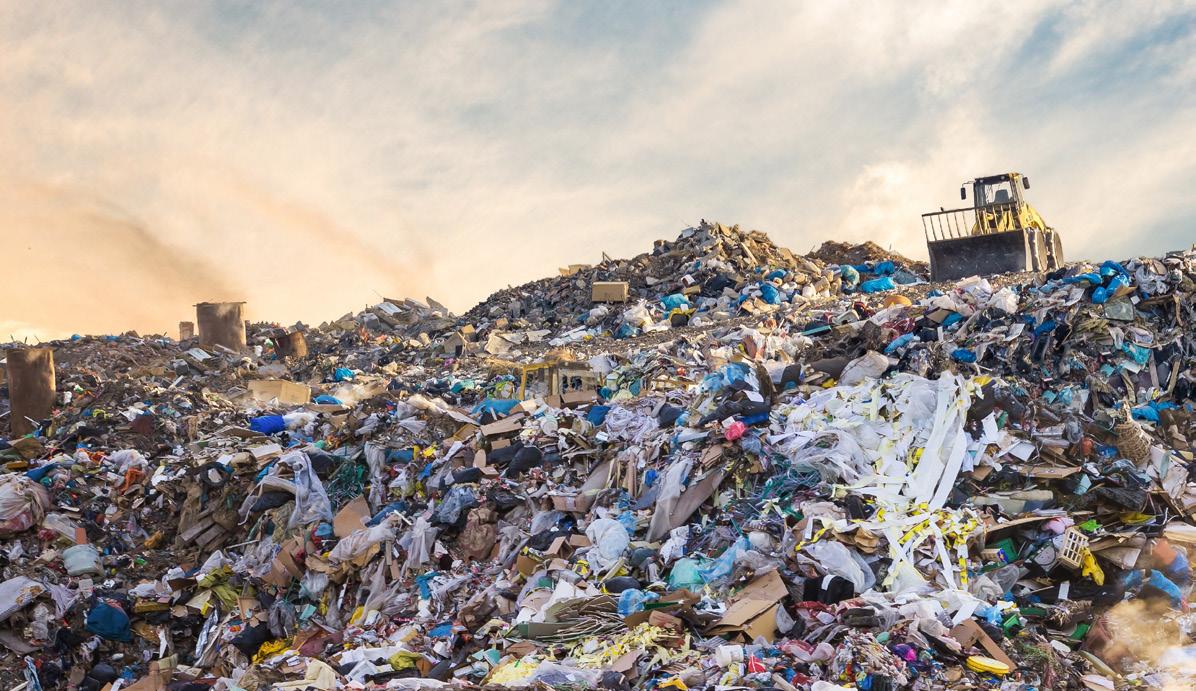
Sustainable Consumption of Sargassum
University of Southampton’s academics have joined colleagues in Ghana, Barbados, Jamaica and Mexico to combat the mass of sargassum seaweed washing up on coastlines, which damages the economy by clogging up fishing nets and making beaches inaccessible, affecting important industries such as tourism. Gathering data from satellites and other ocean-monitoring systems, we are now able to track the movement of the seaweed around the oceans. This enables them to give these countries warning on any incoming influx of sargassum. Researchers from Southampton, York and Jamaica also tested the material finding practical uses for it such as being used as a fertiliser for important crops and and stimulate the growth of mangrove forests at the sea’s edge. Both are crucial for supporting the affected region’s economy and improving food security.
The University of Southampton, in collaboration with other UK institutions, introduced an innovative biodegradable electronic textile (e-textile) technology SWEET (Smart, Wearable, and Eco-friendly Electronic Textiles). This development addresses the environmental challenges associated with traditional e-textiles by utilizing sustainable materials and manufacturing processes. The e-textiles can reliably monitor human physiological parameters, such as heart rate and temperature, meeting industry standards. Biodegradability assessments revealed that after four months in soil, the fabric lost 48% of its weight and 98% of its strength, indicating effective decomposition.

Our Sustainable Resource Management module provides students with knowledge and skills related to the wide range of sustainability challenges surrounding waste collection, reuse, recycling, minimisation and prevention. The module considers human behaviour in relation to waste management, issues such as single use packaging, recycling rates, legislation relating to waste and the circular economy.
The University of Southampton provides a Strategic Operations and Supply Chain Management MSc allowing students to gain develop strategic perspectives on logistics systems and supply chains, explore supply chain sustainability and learn a wide variety of strategies around resilient sourcing.
The university wide Green Week 2024 was themed “Change One Thing”, inspired by an initiative from colleagues in the Business School, working with the SUSU team and Sustainability Community of Practice (formed of hundreds of staff and students from across the university). Workshops, expert talks and a range of creative activities provided practical advice on how to make easy-to-adopt whilst impactful sustainable lifestyle swaps, around food, shopping, banking, technology, water and energy usage habits. Attendees reported that Green Week inspired thoughtful conversations around simple changes and motivated real improved behaviours, which have been adopted on and off campus and beyond
When providing staff with electrical and electronic equipment all measures are taken to provide reused and refurbished equipment to minimise our environmental impact and reduce WEEE (Waste Electronic and Electrical Equipment).
University coffee shops offer discounted prices to customers who bring a reusable cup for their beverages. Recycling facilities and food waste collection is provided across campuses and within University of Southampton Halls of Residences.
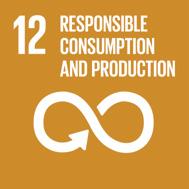
Research
As a key part of working towards the University of Southampton’s Sustainability Strategic Plan critical work is being undertaken to improve the sustainability and efficiency of our laboratories. The Laboratories Efficiency Assessment Framework (LEAF) is a global standard developed by UCL for improving the sustainability and efficiency of laboratories. LEAF consists of a Framework, Toolkit and learning materials for those institutions that join. The University of Southampton joining LEAF was led by laboratory technical staff working with the University Sustainability Team and coordinated by Peter Morgan, the Technical Staff Representative on the Sustainability Implementation Group.

LEAF provides guidance and criteria for a wide range of areas for improvement including but not limited to: procurement, energy use, waste management, water, education for lab users and laboratory based teaching. Using LEAF, we can also calculate both our carbon and financial savings from the sustainability actions our laboratories have undertaken.
LEAF has been applied in numerous laboratories across the University, sixty-seven laboratories are participating in the scheme and we have achieved forty-eight Bronze Awards and twelve Silver Awards. There is a thriving and dedicated community of staff working together to enact LEAF across our laboratories.
Written with Peter Morgan

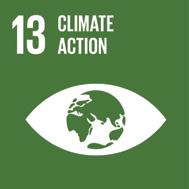

Research Outputs: 691
Child labour is a hidden consequence of environmental shocks. The severe droughts of the early 2000s, which affected nearly half of India, highlight this relationship. Amruta Sadashiv Bagwe’s doctoral research uses Young Lives Survey data to demonstrate that such crises prompt children to spend more time out of school working rather than resting or playing. Many Indian states remain drought-prone, and state interventions often fail to fully offset the negative impact on children’s schooling and work decisions.
Number of Citations
16,593 Field-Weighted
The Farming the Storm: How In-Situ Adaptation shapes Migration decision in Tanzania study examines how climate-smart agricultural practices influence household migration decisions in Tanzania. Adaptation measures such as intercropping, irrigation, and fallowing can directly reduce agricultural emissions, supporting SDG 13 (Climate Action). The research explores whether these practices enable migration by easing financial constraints or reduce the need to migrate by increasing resilience. By identifying what drives the uptake of low-emission, sustainable farming, the study sheds light on climate-related rural mobility. Findings highlight the complex interplay between adaptation and migration.
The Data Environmentalism (HUMA2026) module is about the fact that data is material. It is produced by people, made possible by resource extraction, needs power to survive, and inhabits and resculpts the landscape. The use of data, then, contributes to climate change, but that role can be hard to see, hidden as it often
is by a veneer of utopian hype that surrounds the information technology sector. Building on these topics, in Data Environmentalism students work together to produce public outcomes on these topics – including podcasts, videos and marketing campaigns – with the aim of changing opinions and fostering climate action.
In January 2024, as part of the UN’s Sustainable Development Solutions Network (SDSN) UK, the SRI brought together researchers, policy makers and industry professionals to identify the most pressing research questions for a Net Zero future by having experts from different sectors and academic disciplines contributing their unique perspectives on what the greatest challenges and opportunities are for decarbonisation.
Our Sustainability Strategic Plan sets out our carbon reduction targets. The University of Southampton have a target to reduce scope 1 and scope 2 carbon emissions to net zero by 2030. We are working towards developing a robust approach to measuring scope 3 emissions and setting an ambitious emissions reduction target . Find out more: Scan the QR Code to listen to a podcast episode related to this SDG!


Maritime Institute
Southampton Marine and Maritime Institute (SMMI) is a unique, internationally recognised centre of excellence for research, innovation and education. The institute’s work spans both the natural ocean environment (marine) and human use of the sea (maritime). SMMI supports and leads world class research, innovation and education.SMMI has seven special interest groups (SIGs) that focus on a specific theme, such as Ocean Justice and Digital Oceans.
The University of Southampton provides Marine Biology Undergraduate and Masters degrees in the School of Ocean and Earth Sciences. Students can undertake a wide variety of modules such as ‘Marine Conservation and Policy, learning a range of monitoring techniques, whilst gaining insight into the global challenges facing our marine environments..
Monitoring Studland Bay’s seagrass and eco-moorings
Studland Bay is a popular boat anchorage which has impacted its delicate seagrass habitat. A Marine Conservation Zone was declared 2019 and in 2021 declared a voluntary noanchor zone to protect its seagrass and iconic
seahorses. Collectively the Studland Bay Marine Partnership, of which the University is a partner, has raised £500,000 to install 87 eco-moorings (2021-24) to solve the anchoring problem. This has markedly changed boater’s behaviour, ceasing to anchor and instead use the moorings.
Both ground truthing remote surveys and monitoring its iconic seahorse population are time consuming, only realistic with large numbers of volunteer divers. Together with colleagues and research students we are showing recovery of the habitat from previous damage.
The University of Southampton is a hosting partner for one of the world’s top oceanographic institutions the National Oceanography Centre. This provides our postgraduate and undergraduate students the opportunities to study in a world class and cutting-edge facilities, research vessels and a wide range of unique fieldwork opportunities.
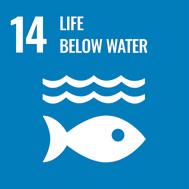




Researchers at the University of Southampton, UK, and the National Institute of Technology in Rourkela, India, have assessed the impact of mining dust on forests in Eastern India. The research team led by Jadu Dash, Professor of Remote Sensing at the University of Southampton, and Professor Amit Kumar Gorai studied detailed satellite images to inform its findings. Their research provided an insight in understanding and mitigating the negative impact of mining on the surrounding ecosystems in future environmental management.
We offer a Biodiversity and Conservation Master’s degree programme through the School of Biological Sciences. Through this programme students gain advanced skills in monitoring species diversity, population change, abundance and distribution. Students also learn about the socioeconomic context and human causes of various environmental issues and gain an understanding of the legal frameworks of environmental regulation.
The Nature & Biodiversity PCE Hub, coordinated by the Public Engagement with Research Unit, was the first of the four PCE Hubs, pioneering the model that has been so successfully replicated in the other three areas. Its 230 friends/members have collaborated on numerous projects and activities from spreading awareness to actively increasing local biodiversity and fighting the effects of climate change. 9
Nature & Biodiversity PCE Hub organisations exhibited at Science and Engineering Day 2024, sharing their messages and activities – including building bat boxes and bug hotels to take home - with over 5,000 visitors. The PCE Hubs also work closely with Southampton Green Network, Southampton Climate Action Network, the Schools Environmental Education Network, the New Forest Educators’ Forum, and the Hampshire Outdoor Learning Network.
Valley Gardens is a botanical garden on our Highfield Campus which is home to a wide variety of plant, bird and invertebrate species. Students, staff and visitors have access to this area and can enjoy the bountiful wildlife, complimented by the well-established mental health benefits of regular and unrestricted access to green space.
The University of Southampton has achieved Gold Accreditation by the British Hedgehog Preservation Society, this accreditation was awarded to the Hedgehog Friendly Campus Society and builds on previous efforts towards hedgehog preservation and safety on campus with the University previously holding Bronze and Silver status.

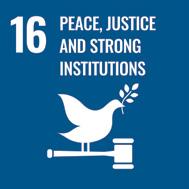

Rehabilitating Probation
Professor Harry Annison (Southampton Law School) is a member of the major ESRC project ‘Rehabilitating Probation’, which through longitudinal qualitative research has drawn out lessons for criminal justice leaders and practitioners about the impact of organisational change: focusing on probation services, whose work where effective can play a key role in promoting peaceful and inclusive societies.
The University of Southampton provides undergraduate and postgraduate courses for Law, Politics and International Relations, and Criminology. These programmes provide modules across our curricula related to law, social justice and peace.
Public Policy Southampton
Public Policy Southampton is our unit dedicated to connecting researchers with policymakers across local, national and international government to support evidence to policy mechanisms and relationships. Public Policy Southampton keeps researchers informed on current Government Areas of Research Interest, provides funding to projects through The New Things Fund, connects policymakers
with researchers to support policy development and develops policy briefs among many other evidence to policy supporting schemes and activities.
Public Policy Southampton provides researchers with opportunities to take placements and secondments within government bodies. The annual Policy Associate Scheme allows Post Doctoral Researchers and Postgraduate researchers to work on short term projects gaining new skills and supporting University projects through providing stakeholder analysis and policy synthesis.
The University of Southampton has a code of practice to ensure the freedom of speech for staff, students and visitors.
We run a Report + Support service, allowing users to report an act of discrimination, harassment, hate or abuse either anonymously or with their contact details to allow a support worker to contact them.

Find out more:
Scan the QR Code to listen to a podcast episode related to this SDG!
Field-Weighted
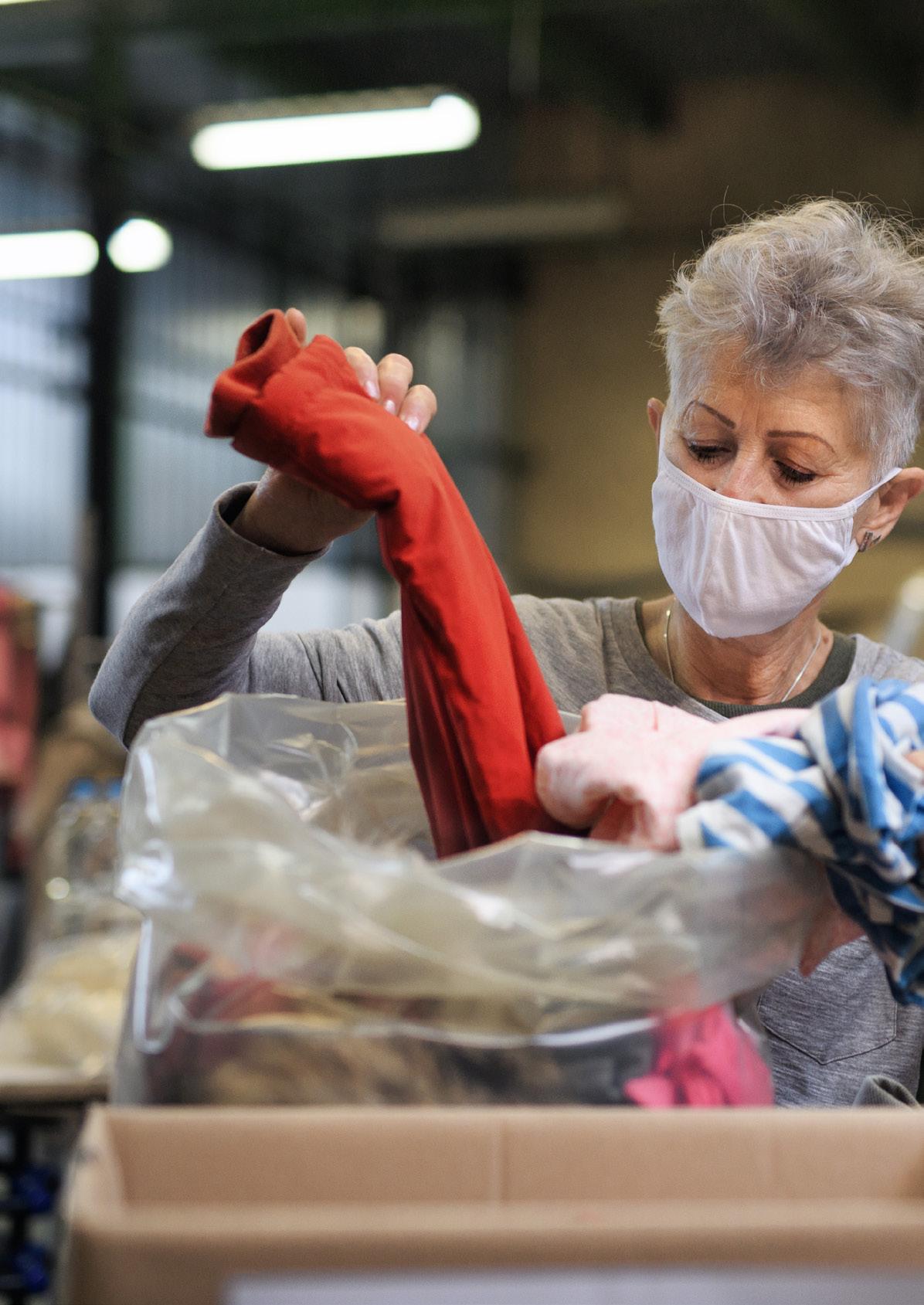
The University of Southampton strives to work towards both social and environmental sustainability across all aspects of University life. We have a wide array of policies and strategic plans that support our staff, students and community through our Triple Helix Approach
Environmental and Sustainability Policies and Strategic Plan
The University of Southampton has a publicly available environmental policy. This policy was updated in 2023 and signed by Professor Mark E. Smith CBE President and Vice Chancellor of the University of Southampton. The policy is reviewed annually as part of our Environmental Management System review and Sustainable Development Goals reporting.
The University has a publicly available Sustainability Strategic Plan 2020-2027 (updated from the 2020 – 2025 plan in 2023).
The University of Southampton updated its Travel Plan in 2024 including improvements and consideration of the sustainability challenges around travel for our staff and students.
Electronics Watch
The University of Southampton is part of the Southern Universities Purchasing Consortium (SUPC) and is therefore a Consortium Affiliate of Electronics Watch. Electronics Watch is an independent monitoring organisation which works to achieve respect for labour rights in the electronics industry.
Can’t Buy My Silence Pledge
The University of Southampton has signed the ‘Can’t Buy My Silence’ Pledge, committing to: “not using non-disclosure agreements (NDAs) to silence people who come forward to raise complaints of sexual harassment, abuse or misconduct, or other forms of bullying.”
Action and Participation Plan
The Access and Participation Plan sets out how we, as a university, will improve equality of opportunity in higher education.
The plan covers how we encourage a broader spectrum of students into higher education and how we support all students to achieve their very best whilst they are studying here. We have a long-term record in supporting access, participation and success by students from under-represented groups and we are proud of the many and varied ways we support the needs of students during their time with us.
Our Access and Participation Plan has been developed in close consultation with the Southampton University Students’ Union.

The University of Southampton collaborates globally with academic institutions, non-governmental organisations, charities, international, national and local governments and communities. Our collaboration across countries and organisations across the SDGs and sustainability in research is vital to sustainable development.
We collaborate through our Sustainability and Resilience Institute with the United Nations Sustainable Development Solutions Network and develop and support numerous other international, national and local networks.
LinkedIn profile, which enhances their professional identity. Another experience of this collaboration, was the opportunity to attend the COM2 conference at PwC headquarters, London, where students networked with leading sustainability experts, business owners and consultants, exposing them to discussions around green careers and internship options.
In Residence: Measuring the impact of communitybased Green Social Prescribing programmes
Research Outputs: 10,996
215,740
Number of Citations
Our four Strategic Research Institutes: The Institute for Life Sciences, The Southampton Marine and Maritime Institute, The Web Sciences Institute and The Sustainability and Resilience Institute are key focal points.
Responsibility for the Social Impact Lab (SIL) moved to Careers, Employability and Student Enterprise, bringing social-innovation activity into the same portfolio as Student Enterprise and allowing both strands to share facilities such as the Student Enterprise Junction.
Since the transfer, SIL programmes have supported more than 230 students. September saw a threestrong delegation compete and experience the Enactus World Cup in Kazakhstan, a trip financed by a new £5,000 sponsorship from BDO, curated through Enactus UK.
Since 2020, the University’s Public Engagement with Research unit, has worked in partnership with Southampton Voluntary Services through an innovative residency programme. Co-hosting a Community Development Worker, community needs were identified: access to green spaces and nature and supporting community groups/ organisations to gain a better understanding of impact measurement tools to evidence the effectiveness of green interventions. Receiving direct coaching from an experienced researcherin-residence, four community based green social prescribing interventions: City Farm, Community Roots, Drawing on the Outside, Plants for People, were awarded funding testing in action, different approaches. Learning outcomes were presented at a sharing event and through a collaboratively produced, Green Social Prescribing Toolkit (launching in Autumn/Winter, 2025).
67.3%
In the autumn, the 100 Big Ideas competition was relaunched with a focus on social impact. Of the 100 winning entries, sixty-nine fell into the Ideas for Impact stream, clear evidence of student appetite for socially oriented innovation.
Can Marketing Save the Planet? Partnering for learning and impact
As part of the new Sustainable Marketing module, after connecting with the authors of CanMarketingSaveThePlanet.com, students used their Learning Zone to engage with a wide range of external resources, to improve understanding of sustainability issues linked with buying choices and marketing promotion. Every student gained a Sustainable Marketer certificate to share on their
The University’s Sustainability Community of Practice (SCoP) is a grassroots network of staff and students passionate about embedding sustainability into everyday practice. The Community provides a welcoming, action-focused space for people from all roles and disciplines to come together, learn, challenge and lead change. Through regular sessions exploring the issues, the latest institutional research and practical tools such as Donut Economics to sustainable service design. By nurturing agency and collaboration, SCoP is growing a culture of responsibility and innovation demonstrating how bottom-up networks can powerfully support the delivery of the UN Sustainable Development Goals across education, engagement and operations.
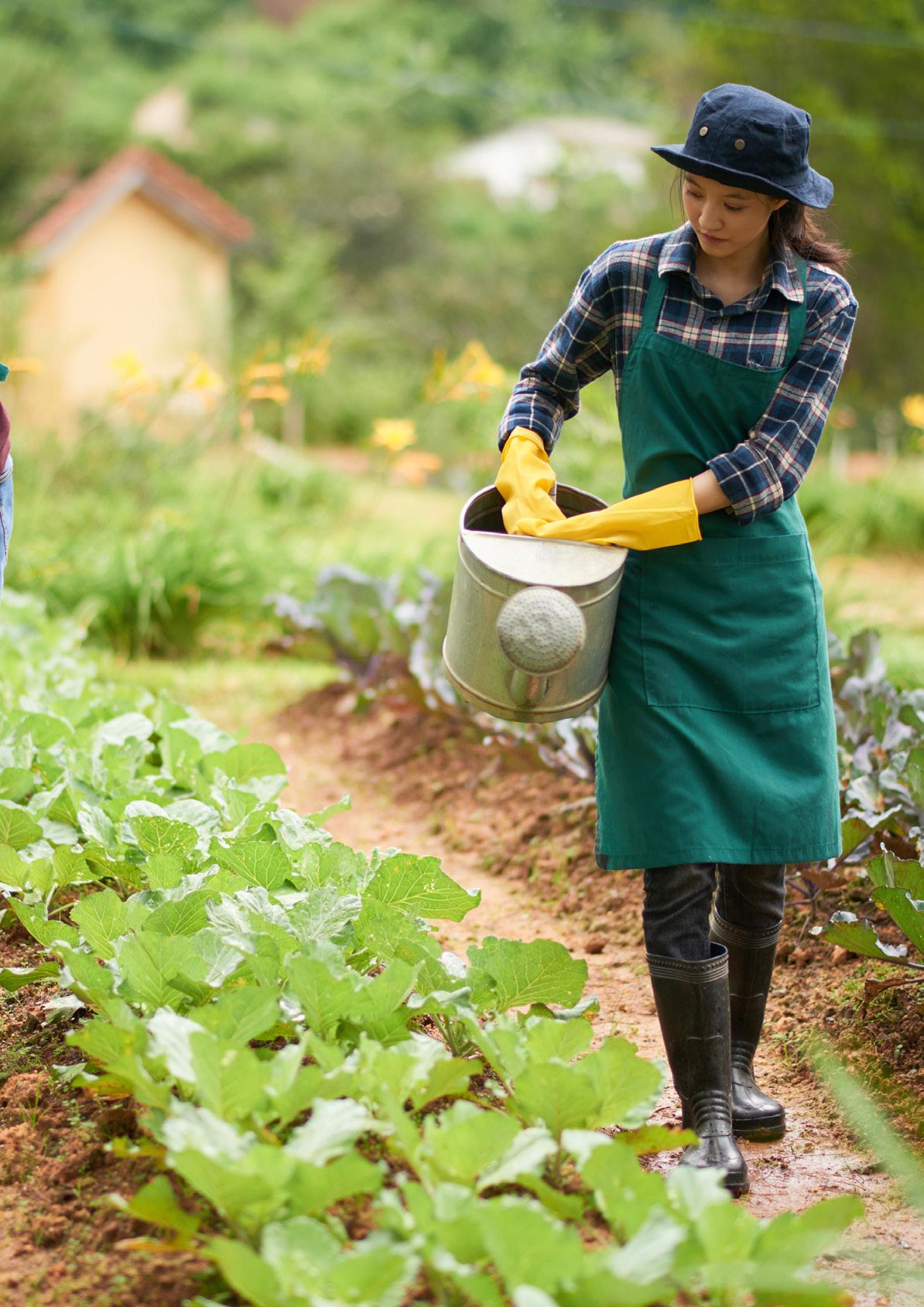
The Public and Community Engagement (PCE) Hubs, coordinated by the Public Engagement With Research Unit (PERu) are networks that bring together the local Voluntary, Community and Social Enterprise (VCSE) sector with our staff, students, and research; supporting impactful collaborations and driving positive social change that celebrates and enriches our city and region. In 2024 all Hubs events were catered by Easy Tz Meals, a local social enterprise creating healthy, affordable meals from surplus food, and Communibakes which supports local charity Communicare in Southampton. By working with local social enterprises Cross Culture Hub and Feed the Community Program, there was zero food waste at these events. By working with the Careers team and SVS we have increased the number of local VCSE organisations who have benefited from increased capacity – while supporting our students to take active social justice roles in their adopted city, increase a sense of belonging - through funded internships and student innovation projects. Furthermore, 84% of the Hubs’ annual budget went directly into local VCSE sector organisations through buying in services from them in place of standard for-profit organsiations, funding co-design and co-delivery, and supporting participation in outreach activities through stipends and bursaries.

We are dedicated to research collaboration, with our research partners spanning other Academic Institutions, Government Bodies, Medical Institutions, Non-Governmental Organisations and numerous other global partners. Figures 3 and 4 demonstrate both our international and general research collaboration.
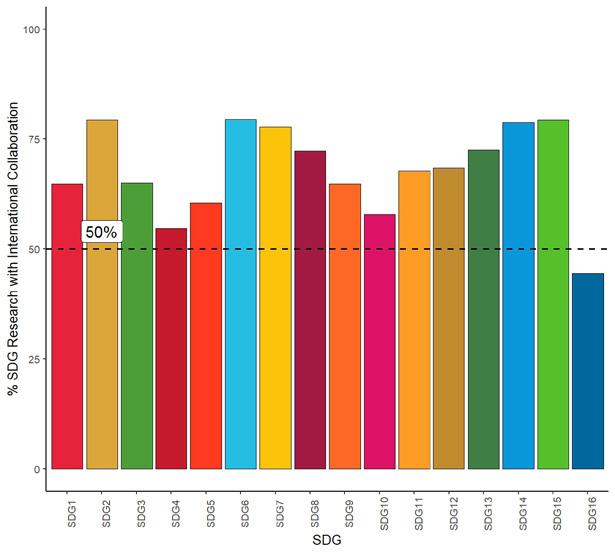

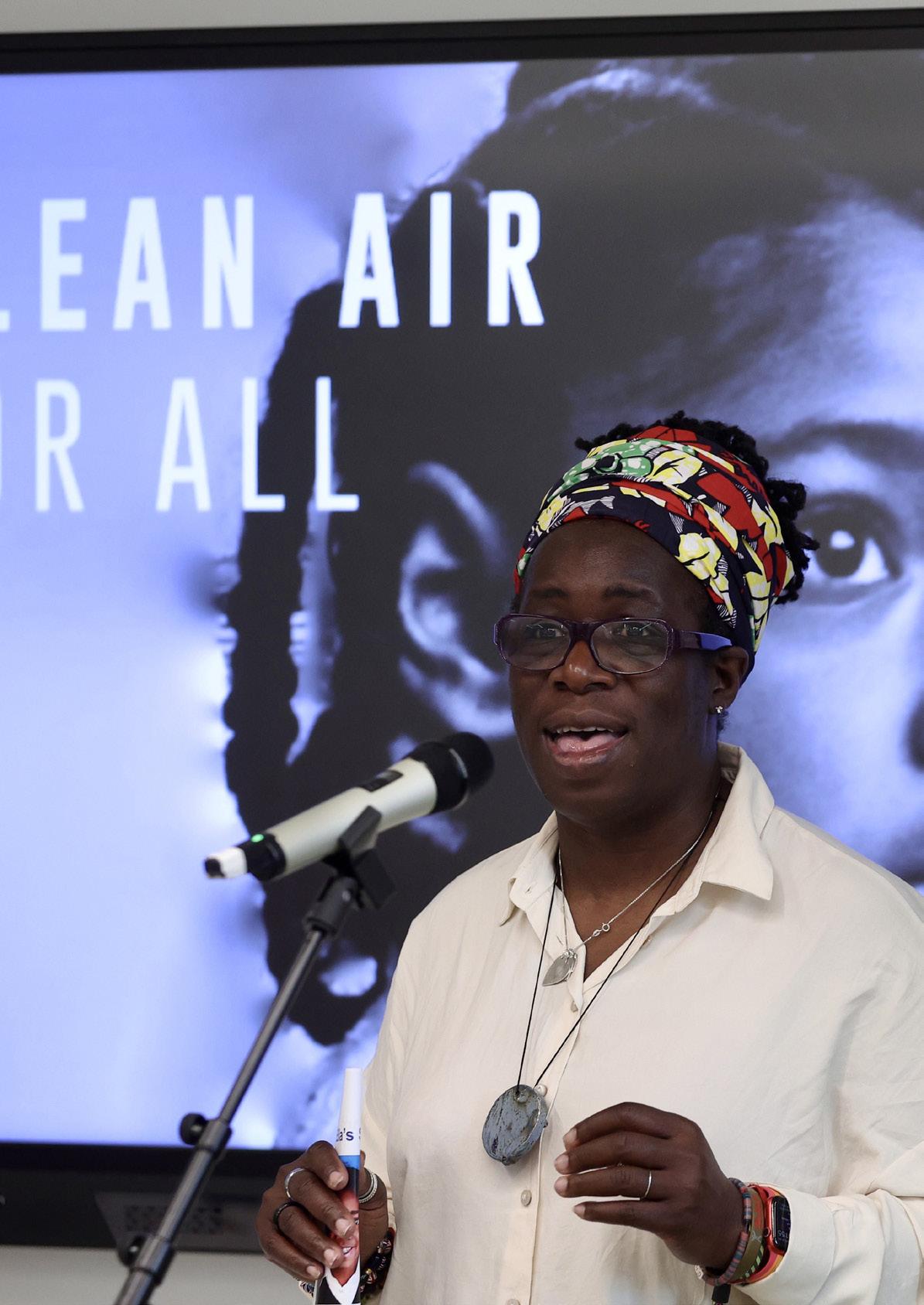
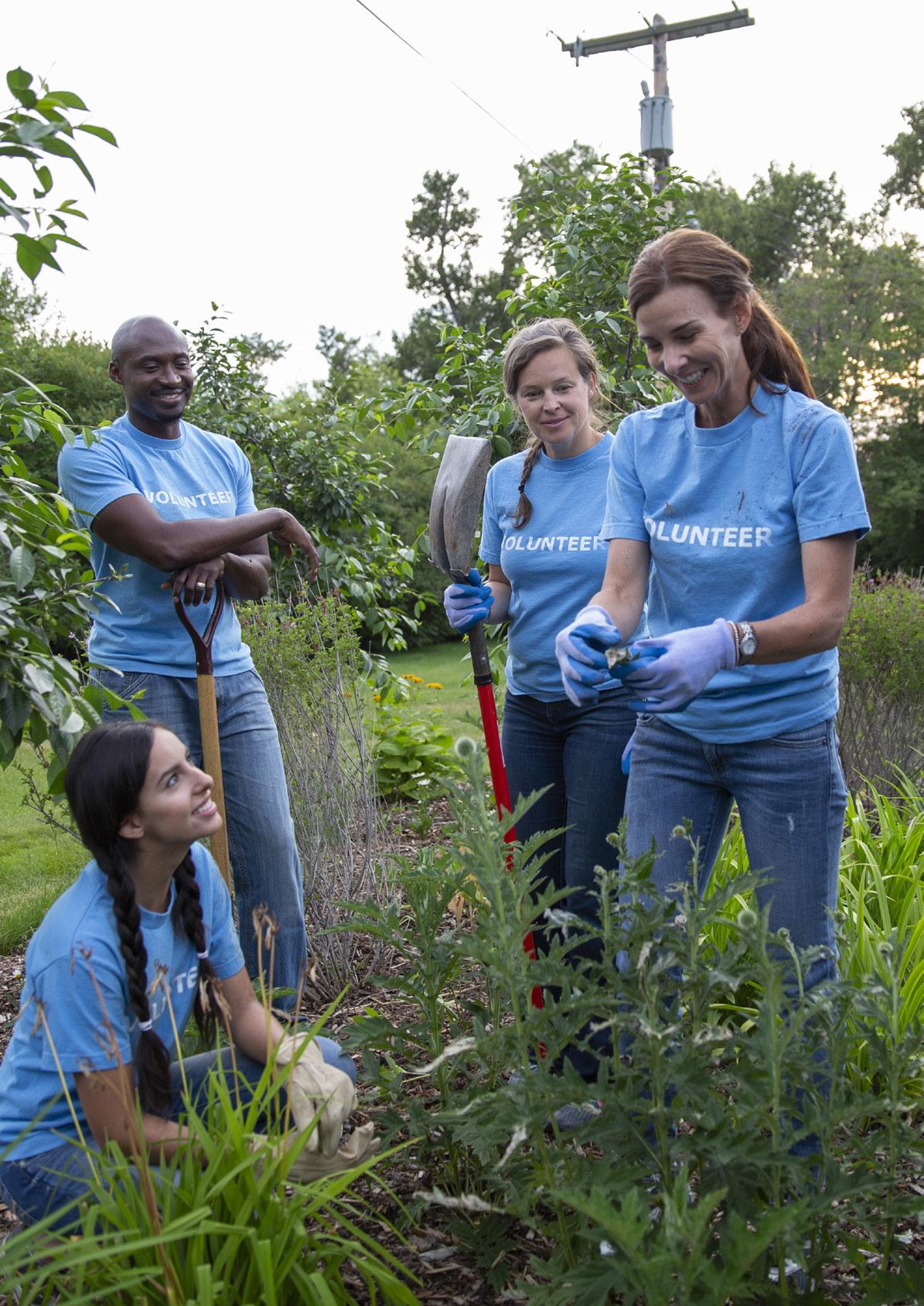
As we reflect on our progress working towards the Sustainable Development Goals and the examples given in this report of the impressive array of work our researchers, staff and students have produced in 2024, we look forward to what will be achieved in the future.
Thank you to all our staff and students in our combined effort from all areas of the University to strive towards a more sustainable future.
5:
6:
6:
6:
7:
Credits
Lead Author, research, data analysis, coordination:
Alice Brock Sustainability and Resilience Institute
Sustainable Development Goals Project Officer.
Co-author, Student Perspective Review, and research: Elio Leka Ignite Intern
Contributor: Stavan Pareek
Consultant: Simon Kemp, Deputy Director
Sustainability and Resilience Institute
Consultant: Jon Lawn, Collaboration Manager
Sustainability and Resilience Institute
Consultant and coordination support: Ellie Pun Senior Coordinator Sustainability and Resilience Institute
With case studies provided by:
Public Policy Southampton
Public Engagement with Research Unit
WorldPop
Social Impact Lab
Alison Bennetts
Amruta Sadashiv Bagwe
Christina Vanderwel
Dalia Tsimpida
David Light
Ella Hyde
Emma Tompkins
Fabien Littel
Fiona McMurray
Harry Annison
Ian Coady Jack Kennedy
Nuala Mcgrath
Ronda Gowland-Pryde
With thanks to:
The Ignite Internship Programme
SRI Membership
School of Geography and Environmental Science
SRI Core Team
Research and Innovation Services
Research and Innovation Services Communications Team
Sustainability Implementation Group
AbuBakr Bahaj
Tara Chilcott
Peter Morgan
